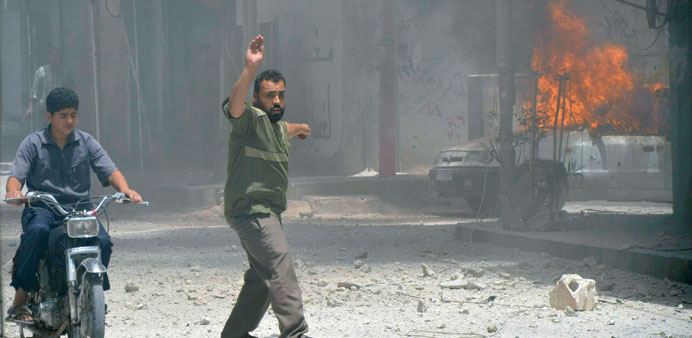|
Critics of America’s Middle East policies are reminiscent of Woody Allen’s quip in Annie Hall: “The food at this place is really terrible...and such small portions.” The US is seen as the culprit behind many of the region’s ills, and yet it is accused of not being sufficiently engaged, of “leading from behind”, of failing to support democracy, of abandoning its friends, and so on. Given all the accusations that the US faces for its involvement in the region over the decades, one would think that America would be invited to stay home. |
But the region cries out for leadership, and the US remains the only country that can provide it. The problem for the US is not the divisions in the Middle East that it must understand and navigate better, but rather the divisions within the US that have eroded domestic consensus on many foreign-policy issues. Those internal differences are what have kept the US on the sidelines during the latest Middle East upheavals.
America used to have essentially two varieties of foreign-policy positions: realist and idealist. But today opinions are fragmented across a broad range of positions – a situation that also cries out for leadership.
President Barack Obama’s oft-stated view that “we need some nation building at home”, combined with his antiseptic waging of drone warfare, indicates that he is erring on the side of the isolationists of both the left and the right. Unilateralism, it seems, is fast becoming the isolationists’ internationalism.
What the US needs is to explain better to its own people why America should engage more deeply with the Middle East’s mounting problems. This is not to say that the US should necessarily engage with every problem. But, whether America is engaged or not, it does need a policy.
Syria is a case in point. The situation there, predicted by every pundit around, has metastasized and threatens to become a full-blown regional civil war. The US has reacted to this international catastrophe by providing light arms to some rebel groups in order to inflict a pinprick on President Bashar al-Assad’s regime for its use of chemical weapons months before.
This is not serious policy. Military assistance should support a political plan, not serve as a substitute for one.
A month ago, there was a brief moment of hope when US Secretary of State John Kerry began an effort to find a way forward with the Russians. The Kremlin’s consequential and sustained support of Assad is serious policy, and suggests that if the US is to make progress short of confrontation with Russia, it should work with Russian leaders to narrow the differences so that, at the end of the process, a peace conference is held.
Indeed, successful US policy in the Middle East has usually included a serious Russian track. Instead, the talks with the Russians seem to have run aground on the question of calling a conference among the warring parties to agree on elections. But elections in sectarian conflicts tend to be merely a census, and the Assad regime and all the other players know full well that Syria is a Sunni-majority country. There is no need for an election to determine that.
What is not known is whether there is a set of future political arrangements on which the parties could agree. It is not known, because it has not been tried.
Meanwhile, the Obama administration has made no effort to explain what it is doing and why, engaging instead in public handwringing over the complexities of the problem. But building monuments to difficult problems is not a policy.
As Churchill once wrote about the “Mulberry” harbours (his ingenious plan to install prefabricated floating piers a day after the Normandy landings), “the difficulties will argue for themselves”.
Obama’s explanation of a Syrian policy might look something like this: “Syria is a difficult problem that, left unchecked, could threaten US interests in the region. No side can prevail and win outright, so there must be a negotiated settlement on the political arrangements that follow the conflict. The US will work with partners in the region and internationally to assist the Syrians to find a way forward. Syrians need to understand what their country will look like in the future, so that all sides can see a solution that can be secured through negotiation rather than violence.”
He should then announce concrete action to achieve this goal: “Today, I have directed State Department teams under Secretary Kerry to visit key international capitals – in Europe and Arab League countries, as well as Moscow – in an effort to agree on a set of principles around which Syrians can find common ground.”
The first principle could be that Syria should continue to exist within its current borders. Another might be that Syria will be a federal state, with broad local autonomy. A third could concern the shape of a future parliament. And so forth.
When agreed, these principles could be announced as an international peace plan. Only when one or more parties to the conflict reject it has the moment arrived to consider a serious effort to arm some of the combatants.
In the end, a solution in Syria will depend on Syrians’ agreement on future political arrangements.
There are those who say that the Syrian crisis could have been addressed two years ago, but that now is too late. Two years from now, some will say the same thing. But if the US can work with partners on the specifics of a future political plan, it can still rescue Syria, not to mention itself.- Project Syndicate
♦ Christopher R Hill, former US assistant secretary of state for East Asia, is dean of the Korbel School of International Studies, University of Denver.

